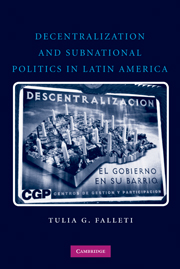Book contents
- Frontmatter
- Contents
- List of Tables
- List of Figures
- Acknowledgments
- List of Abbreviations
- 1 Decentralization and the Revival of Subnational Politics
- 2 A Sequential Theory of Decentralization and the Intergovernmental Balance of Power
- 3 Argentina
- 4 Colombia
- 5 Brazil
- 6 Mexico
- 7 Conclusion
- Bibliography
- Appendix: List of In-Depth Interviews
- Index
- References
Bibliography
Published online by Cambridge University Press: 05 June 2012
- Frontmatter
- Contents
- List of Tables
- List of Figures
- Acknowledgments
- List of Abbreviations
- 1 Decentralization and the Revival of Subnational Politics
- 2 A Sequential Theory of Decentralization and the Intergovernmental Balance of Power
- 3 Argentina
- 4 Colombia
- 5 Brazil
- 6 Mexico
- 7 Conclusion
- Bibliography
- Appendix: List of In-Depth Interviews
- Index
- References
- Type
- Chapter
- Information
- Decentralization and Subnational Politics in Latin America , pp. 249 - 270Publisher: Cambridge University PressPrint publication year: 2010



